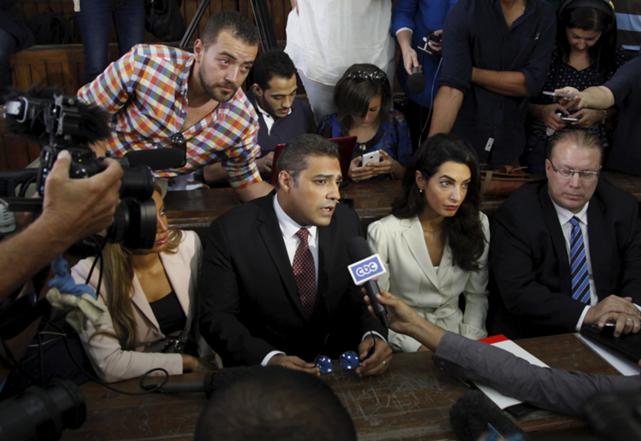Former Al Jazeera English Cairo Bureau Chief Mohamed Fahmy, journalist Peter Greste and producer Baher Mohamed were sentenced on charges of practicing journalism without government permission and for spreading "false news".
This statement was originally published on freemedia.at on 29 August 2015.
The three-year sentence handed today to three Al Jazeera journalists by an Egyptian court is “outrageous and disgraceful”, the International Press Institute (IPI) said.
Former Al Jazeera English Cairo Bureau Chief Mohamed Fahmy, Al Jazeera journalist Peter Greste and Al Jazeera producer Baher Mohamed were convicted of practicing journalism without government permission and for spreading “false news”, media outlets reported.
Fahmy and Mohamed – who was reportedly given an additional six-month sentence on top of the initial term – were immediately taken into custody following the delivery of the verdict. Greste, who was deported to Australia after the three were initially released following a decision to grant a retrial in the case in January, was tried in absentia.
“Today’s decision represents a new nadir for press freedom in Egypt,” IPI Director of Advocacy and Communications Steven M. Ellis said. “While the signal it sends to journalists – that the state is perfectly willing to arbitrarily persecute and imprison those who report unwelcome news – is loud and clear, so, too, is the signal that it sends to the rest of the world: Egyptian authorities have little regard for democratic values or the rule of law.
“That such a politicised case relying on such flimsy evidence has been allowed to proceed this long and to this conclusion is outrageous and disgraceful. We stand by our colleagues and we call on Egypt to release them, and all other journalists imprisoned in connection with their work, immediately.”
IPI decried the deteriorating state of press freedom in Egypt last week as it unveiled a list of recommendations for improvement that were developed during a series of roundtable discussions held in Vienna, Doha and Geneva in 2014. The discussions brought together journalists, academics, members of civil society and others to address challenges facing press freedom and media independence in Egypt.
According to the New York-based Committee to Protect Journalists (CPJ), as of Aug. 12 some 22 journalists were currently imprisoned in Egypt in connection with their work. They include journalists detained in connection with the “Rabaa Operation Room” case, named in reference to a camp erected in Cairo’s Rabaa al-Adawiya Square protesting the 2013 removal from office of then-President Mohammed Morsi. Government forces cleared the camp in a bloody August 2013 operation. In April of this year, a court sentenced one journalist in that case to death and another 13 journalists to life in prison.
Journalists currently detained also include photojournalist Mahmoud Abou Zeid, aka Shawkan, who has been held since August 2013 when he was arrested while covering the Rabaa al-Adawiya Square protests. Abou Zeid has alleged abuse at the hands of his jailers and is described as being in “failing health”.
Last week, Egypt also approved a new anti-terrorism package punishing journalists whose coverage of militant attacks does not toe the government line.



